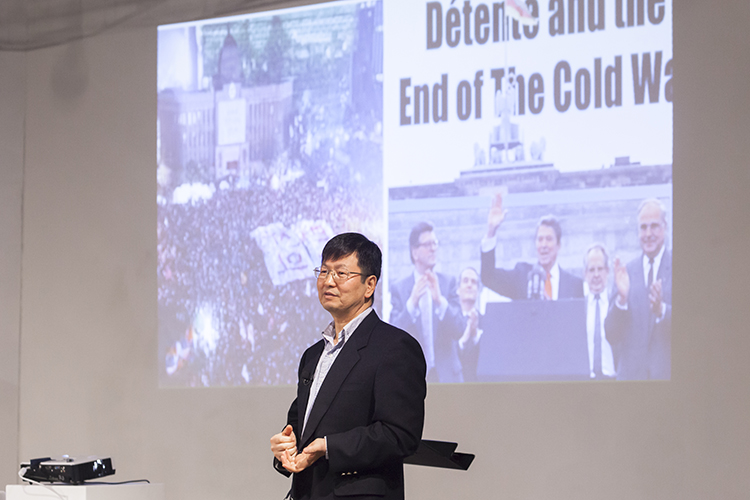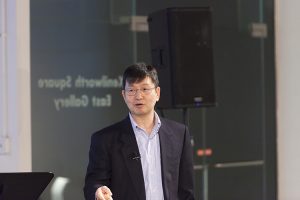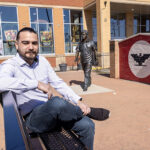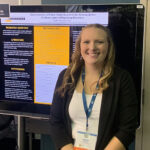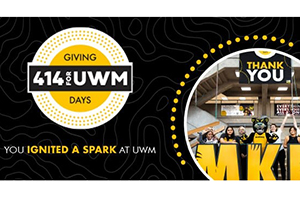Two bags of cough drops sit open on the desk of UWM’s Uk Heo, but the distinguished professor of political science isn’t sick. He’s just busy: giving talks, doing media and writing his sixth book. That’s what happens when you’re an expert on topics that suddenly the world can’t learn enough about – North Korean and South Korean politics, U.S. foreign relations and the nuclear arms race.
The cough drops keep Heo’s vocal cords in shape. His painstaking research process and analytical skills do the rest of the work. He said he’s writing book No. 6 faster than he’s written anything in his 22-year career.
“If anything new happens on the Korean Peninsula while I am writing and my book is outdated, then it will not be meaningful,” Heo said. He strikes a calm, matter-of-fact tone whether he’s describing his writing process or authoritarian dictators like North Korea’s Kim Jong-un. “I’m trying to write up the analysis faster than usual.”
In September, North Korea startled the world with an underground nuclear test so powerful it literally displaced a mountaintop. Experts estimate that weapon was 17 times more powerful than the atomic bomb the U.S. dropped in Hiroshima, Japan, in 1945.
Heo says that a next, more troubling milestone would come when North Korea develops a nuclearized missile reliably capable of reaching the mainland United States.
“If that happens, I would call it a game-changer.”
But predicting the future isn’t the domain of political scientists. “You can easily make a fool of yourself in a few months or a few years,” Heo said.
“What I’m interested in is why North Korea wanted nuclear weapons in the first place,” Heo said. “Unless we understand their intention, we cannot come up with a good solution. In order to understand what North Korea wants, why China behaves the way that it does, what South Korea wants, you have to see things from their perspective.”
Yet it’s difficult to see much of anything from North Korea’s perspective. The Kim family has retained firm control of the “Hermit Kingdom” for three generations, dating back to 1948. “There’s no human intelligence coming from North Korea,” Heo said. “It’s a completely controlled and closed society.”
Heo relies on history and theories of political science to explain why the regime prioritizes building missiles while its economy ranks somewhere near those of Azerbaijan and Andorra, and famine and drought plague many of its 25 million citizens.
Heo looks back to the Korean War, when Kim Jong-un’s grandfather, Kim Il-sung, “almost lost his country” when U.N. troops advanced north to the Yalu River, which borders North Korea and China. The siren song of nuclear power, urged on by Soviet ruler Joseph Stalin, became a kind of “regime insurance” for the Kim dynasty in its early days even after the U.N. and U.S. left North Korea.
Two choices for the U.S.
Peninsular geography further complicates matters. Seoul, South Korea’s economic and population center, sits about 40 miles from the Korean Demilitarized Zone. If the north demonstrates a credible ability to strike the mainland U.S., Heo said, America has two possible paths: “To get seriously involved in the Korean Peninsula or to pull out.”
More than 28,000 American troops are stationed in South Korea. If and when U.S. troops leave, a wealthy and democratic South Korea would be deeply vulnerable to monetary demands and military aggression from the north.
“In the past, North Korea was only a threat to South Korea and Japan,” Heo said. “If they have an ability to hit the U.S. continent, North Korea becomes a direct threat to the U.S. That’s why I use the term ‘game changer.’”
Heo hopes that his book will offer policymakers a new window through which to view the unfolding crisis and propose non-military solutions.
“I’m trying to learn from history, apply theories and come up with potential policy solutions,” Heo said. “The U.S. could simultaneously sign intertwined treaties with North Korea, South Korea, Russia and China so none of them can use force against each other. Use that for a security guarantee, and then you talk about North Korean economic aid to dismantle North Korea’s nuclear program.”
He cautions that this can happen only after treaty members can verify that North Korea’s nuclear program is completely dismantled. Trust is clearly an issue between the U.S. and Pyongyang, and this is why any policy solution must be negotiated with participation from other world leaders.
An international outlook defines Heo’s own “compatriotic” perspective. Born and raised in a South Korean military family: “I care about North Korean citizens and see them as fellow Koreans. They did not choose to be North Korean. They were born there and they are the ones paying the price.
“When you consider what the authoritarian regime does to its own people, it’s easy to imagine what they might do to others. That is why I agree with the view that North Korea is a prime enemy and security threat.”
